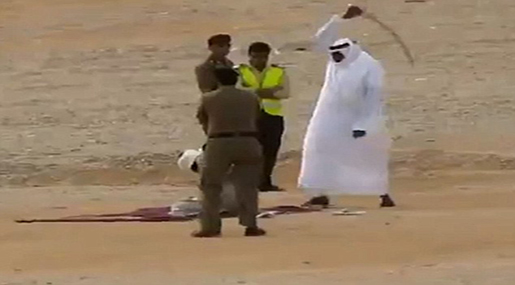These are some aspects of the Saudi "freedom": A Palestinian artist sentenced to death for apostasy. Three young men - arrested when they were minors - faced with beheading. And reports in the Saudi press of the imminent execution of more than 50 people.

The country's human rights record has been back in the news since January, when liberal blogger Raif Badawi was flogged.
That same month, disturbing video emerged of a Burmese woman accused of murder screaming: "I did not kill" until the moment her head was severed with a sword on a Saudi street.
So far this year, more than 150 people have been executed - the highest figure recorded by human rights groups for 20 years.
Dozens of them were convicted of non-violent crimes. Human rights activists say many of the trials were unfair.
Amnesty International has described "an unprecedented wave of executions marking a grim new milestone in the Saudi Arabian authorities' use of the death penalty".
So what is behind the rise of executions?
"There's a lot of speculation," says Adam Coogle, who monitors Saudi Arabia's use of the death penalty, for Human Rights Watch. "But nobody knows the real answer because the Saudis haven't said, and they won't say."
This year has been an eventful one for Saudi Arabia. In January, King Salman succeeded his more liberal brother, King Abdullah, ushering in a new, more muscular foreign policy.
In March, the Saudis began a bombing campaign in Yemen in which thousands of civilians have been killed. And the Hajj stampede put the country under an uncomfortable spotlight.
But the increase in the rate of executions actually began back in August 2014, according to human rights activists.
Another theory is linked to Saudi Arabia's restructuring, over the past few years, of its justice system.
"It could be that, with the increase in the number of courts and judges, the system has the capacity to address a backlog of cases," Coogle says.
"The death sentences are retribution against Shia protesters, some of whom were peaceful," Coogle added.
He further stated that "there's a clear message that if you take to the streets to challenge the house of Saud, you may pay the ultimate price."
Beheading with a sword is the most common form of execution. Executions are often carried out in public.

The families of prisoners facing the death penalty are not always informed in advance of executions.
The case of the young protester, Ali al-Nimr, who has become a poster boy for those facing execution, has drawn appeals from world leaders for King Salman to show mercy and refuse to sign his death warrant.
His family says the confession he made was coerced and he signed it after being told he would then be released.
The fate of Palestinian poet and artist Ashraf Fayadh, 35, has also attracted international condemnation.
He was sentenced to death last week for apostasy, based on a book of poetry he wrote several years ago.
UN human rights experts say the sentence is in violation of international human rights law.
Hundreds of poets and writers from around the world have also called for his release.
"The death sentence against Fayadh is the latest example of the kingdom of Saudi Arabia's lack of tolerance for freedom of expression and ongoing persecution of free thinkers," they said.
Indeed, when a Twitter user described Fayadh's sentence as ""ISIS"-like", one newspaper quoted a justice ministry official threatening to sue.
"Executions are not the only serious human rights concern," says Sevag Kechichian, Saudi researcher for Amnesty International.
"There's been a vicious and systematic crackdown on human rights activists and on peaceful dissent in general - including bloggers and online activists.
"If you are on the UN Human Rights Council, then you are obliged to uphold the highest standards in promoting and protecting human rights."
Source: BBC, Edited by website team
River to Sea













No comments:
Post a Comment